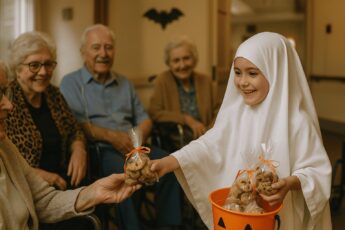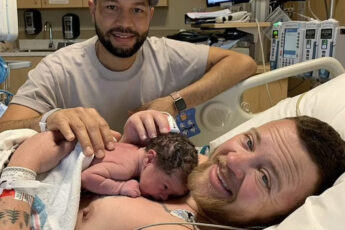The first time Richard Cole saw the girl, she was barefoot, her jeans ripped at both knees, and an old leather-bound book balanced carefully on her lap as if it were something alive. His twelve-year-old daughter, Emily, sat tucked beside her under the sprawling oak in the academy’s courtyard, shoulders hunched with focus, pencil moving in frantic little bursts across a ruled notebook.
Richard had just slipped out of a board meeting at ColeTech—his billion-dollar software empire where people lowered their voices when he entered a room—to pick up Emily. He still carried the scent of the conference table: espresso, polished wood, the ozone tang of air-conditioning. But this—this picture under the oak—stopped him mid-stride, one foot planted, as if the ground had made a decision for him.
“Emily,” he called, softer than he intended, as he approached over the damp bricks.
His daughter looked up, a smile already blooming. “Dad! This is Maya,” she said, bright as if she’d discovered a comet. “She’s helping me with my history project.”
Richard’s gaze shifted to the girl. Maya. Wind had teased her hair into a halo of loose curls; her jacket was patched in careful squares, the kind done by a patient hand. Mud clung to her ankles. She looked seventeen at most. The book on her lap was no classroom text—its spine cracked, edges feathered, pages the color of old letters.
“Helping you?” Richard said. “Are you a student here?” His tone came out polite, measured; the part of him that lived in boardrooms was already scanning for context, risk, explanation.
Maya shook her head. “No, sir,” she said, steady but not defiant. “I—I’m not in school right now.”
Emily rushed to fill the silence. “We met last week when I was stuck on my essay. She knows everything about the Revolution—dates, songs, people’s actual letters! It’s like she’s a walking encyclopedia. She’s been meeting me here to help.”
Richard felt a small frown crease his forehead. He tried to iron it out. “And… where do you live, Maya?”
Maya’s eyes slipped toward the grass, then back to his, as if she’d resolved not to apologize for existing. “Nowhere permanent,” she said. “Sometimes the shelter. Sometimes…” She tipped her chin toward the far side of the park. “Outside.”
The words fell into the autumn air and didn’t bounce. Somewhere above them a flock of starlings turned in a single dark ribbon. Richard straightened, his instincts scattering—liability, safety, the school’s rules—while his daughter barely noticed the weight of what had been said.
“She’s amazing, Dad,” Emily insisted, leaning into Maya’s shoulder like they’d known each other for years. “Two days with her taught me more than two months of textbooks.”
Richard studied the girl again. The jacket might have been thin, but her sentences weren’t. She spoke cleanly, with a careful kind of music. She didn’t ask for pity. She didn’t ask for money. She simply… taught.
“Why are you doing this?” he asked, curious despite himself.
Maya’s fingers tightened around the book’s cracked spine. “Because I believe learning is a way out,” she said. “And because she reminds me of my little sister.” She swallowed. “My sister didn’t get to finish school.”
Emily’s pencil stopped. She glanced between them, sensing the air tilt. “Can we invite her over, Dad? For dinner?” Her voice jumped the way it did when she was trying not to sound like she was begging. “Please?”
Richard’s first answer lined up neatly in his throat: No. This wasn’t how he handled things. His life ran on schedules, protocols, the invisible fences that kept chaos at bay. But something in Maya’s eyes—an unguarded blend of pride and vulnerability—made him pause on the threshold of that word.
“I’ll think about it,” he said, though his mind was already out in front of him, sprinting.
The courtyard clock chimed a bright, precise note. A breeze moved through the oak, scattering a slow confetti of leaves around their feet. Richard rested a hand between Emily’s shoulders, steering her toward the exit. “Come on, Em. We’ll talk at home.”
Emily twisted at the waist to wave, a small, indignant sunbeam. “Bye, Maya! Same time tomorrow?”
Maya lifted the book in a half-salute. “If you want,” she said, and when she smiled it reached her eyes, quick and shy. Then she gathered her knees to her chest under the oak, the leather book set like a treasure against her shins.
On the drive through the city, the boardroom receded. Richard couldn’t latch the image out of his head: a homeless girl tutoring his daughter for nothing but the love of knowledge, quoting letters from people who’d been dead for two centuries, turning history into a house Emily could walk around inside. It didn’t compute—and yet, in a way that unsettled him, it felt like the beginning of something that actually mattered.
At a red light, he glanced at Emily. She was re-reading her notes, mouthing a sentence, rewriting it, the way she did when she wanted every word to land. “Dad,” she said without looking up, “Maya said history is just people trying to be brave. I like that.”
Richard watched the light change. He felt, absurdly, as if some internal signal had changed with it. His empire knew how to scale code to a billion users. But this felt like a different kind of scaling—one girl, one meal, one chance.
When they pulled into the driveway, the house looked too large, as if it had been holding its breath for years. He turned off the engine and stayed there, hands on the wheel. Emily waited him out—the way his daughter had learned to wait out a man who answered too many calls.
“Dad?” she said gently. “We have like a hundred extra chairs.”
He almost laughed. Instead, he nodded once. “We’ll make a call,” he said. “And we’ll do it my way—safely.” His voice wanted to be brisk; it came out warm.
Inside, the quiet felt different. Richard stood in his kitchen that could feed twenty and thought about a girl under an oak tree who had chosen to show up for someone else’s child. He reached for his phone, then set it down, then reached again, a man unused to hesitation.
Out past the gates, the city carried on—sirens somewhere, a bus gassing up, the late sun melting into the river. Under the oak, Richard pictured Maya opening that book again, tracing the faded margins with her thumb. A page caught by the wind. A sentence rescued. A story salvaged.
He didn’t know exactly what he was going to do. Only that he would do something—and that, for once, the something might change more than a quarterly report.
That night, the oak tree wouldn’t leave him alone.
Richard stood at the kitchen sink with his sleeves rolled and the house too quiet, watching the window fog with his breath. His empire ran on dashboards and forecasts—clean graphs that never smelled like wet grass—but his mind kept circling the image of a barefoot girl guarding an old book as if it were a fire she refused to let go out.
He picked up his phone. “Emily,” he called.
She padded in, socks mismatched, notebook still under her arm.
“We’re going to do this carefully,” he said. “Tomorrow, I’ll meet Maya at the school. We’ll make sure we follow every rule and keep everyone safe. If she agrees, we’ll invite her for dinner. And we’ll ask what she needs—not decide for her.”
Emily’s smile was instant and fierce. “That’s the rule at school too,” she said. “Ask before you help.”
He managed a laugh. “Good rule.”
—
The next afternoon, he waited under the oak with the head of school and the shelter coordinator he’d called that morning. The coordinator, a woman with a librarian’s patience and a bouncer’s spine, shook his hand like she already knew how the meeting would go.
Maya arrived with the book hugged to her ribs. When she saw the small group—Emily waving, Richard formal but kind—she slowed, chin tilting up in instinctive defense.
“We wanted to do this right,” Richard said, hands visible, voice quiet. “No surprises. If you’re willing, I’d like to hire you—properly—to tutor Emily. Paid. Through the school. And—if you want—we’ll help you finish your own classes. GED, college prep, whatever you choose. Only if you choose.”
Maya’s eyes moved from him to the coordinator, who gave a small nod that meant: He asked first. He listened.
“I don’t take charity,” Maya said, almost apologizing.
“It’s not charity,” Richard answered. “It’s a job. And an investment—if you’ll let me call it that—in someone who’s already changing my daughter’s life.”
Maya hugged the book tighter. “My sister used to say that school is the only place where the doors open just because you try the handle,” she said. “She didn’t get to finish. A fever, and we were on a waitlist, and—” She swallowed. “I kept her book. It’s… the piece of her that still studies.”
Emily slid closer, teenager-easy. “Then we’ll get it dog-eared for both of you,” she said.
The coordinator cleared her throat. “We can set hours. A stipend. A case worker can help with documents. If there’s a safe place for her to stay—”
“There is,” Richard said. “A guest room at our place, if you want it, just for a while. Or a hotel near the shelter. Or we can fund a bed at the women’s residence. Your call.”
Maya glanced at the coordinator again. “Residence,” she said. “Rules make me feel safe.”
“Residence it is,” Richard said. “And dinner at our house tonight. No obligations. Just food. And a ride back.”
Maya hesitated. Then nodded once. “Okay,” she said. “But I’m bringing my book.”
“That was non-negotiable,” Emily grinned.
—
Dinner was spaghetti because Emily declared that “spaghetti makes everyone brave.” Maya ate like someone who’d learned to make a plate last the whole night, careful portions, napkin folded twice. They didn’t talk about money or shelters. They talked about an Abigail Adams letter that made Emily gasp and slam her palm on the table like a tiny judge.
After, in the doorway, Richard offered the least corporate thing he had. “There’s a bookstore still open,” he said. “If you make me a list, we can go. Used copies. The ones with other people’s notes.”
Maya’s eyes flickered. “Used books are better,” she said. “They already know the way.”
They went. He stayed out of the aisles, let the girls drift between stacks like minnows. When Maya chose a pair of secondhand boots from a discount bin by the register—$12, slightly scuffed—he didn’t mention sizes or brands. He just paid, handed over the bag, and said, “No receipt if you don’t want one.”
“I’ll keep this one,” she said, tucking it between the pages of a newly adopted Frederick Douglass.
On the ride back to the residence, Emily snapped a photo of the oak, the book, and four hands—hers, Maya’s, Richard’s, and the coordinator’s—stacked for exactly one second. She posted it with seven words: “Found a teacher under a tree today.”
—
It took three emails, a background check, and two signatures for the school to formalize a paid “peer scholar” role. It took one more call for the city library to issue a card under the shelter’s address.
The rest happened the way real things happen—slowly, then all at once.
ColeTech’s HR built a small, quiet scholarship line item called the Oak Fund. Not a press release. A test. A pilot that paid for night classes, exam fees, transit passes. No one took photos. People just showed up.
Maya started coming by three afternoons a week. The guest bath cabinet quietly filled with travel-size shampoo and a note that read, “Take what you like. Replace nothing.” She left her boots by the door because Emily insisted shoes never belong alone. Sometimes, when the weather turned mean, she fell asleep on the sofa with a book on her chest and a throw blanket (that nobody admitted placing) over her knees. The residence staff smiled at the routine.
On Fridays, she and Richard argued about history like old friends—Hamilton the tactician versus Washington the weather-eye. She quoted letters; he quoted systems. Emily refereed with a whistle she’d gotten at a field day. They were a family anyway, even if none of them had meant to be.
Then one afternoon, everything that had been quiet went loud.
A food service worker at the academy, wiping down a table, recognized Maya in Emily’s photo. She typed a caption and hit Share. A parent reposted with a paragraph about dignity and doors. A local station called the shelter for comment; the coordinator said, “This is what happens when you ask first,” and that sentence did laps around the internet.
By nightfall, there were a hundred thousand hearts and a thousand hands in the air: How do we help?
Richard’s assistant, who used to schedule investor calls, now answered strangers who wanted to pay for test prep, bus cards, library laptops. ColeTech’s developers built a simple portal over a weekend: UnderTheOak.org—pairing students who needed help with people who had it to give. No middlemen. No pity copy. Just boxes to check and a map of the city that filled with small green lights.
Someone leaked that the CEO had been seen buying used books and $12 boots and washing dishes after spaghetti. The headlines wrote themselves. He ignored them. He had meatballs to burn and a study guide to staple.
—
On the morning of her GED exam, Maya sat at their kitchen island in a sweater Emily had “accidentally” left in her bag, tapping a pencil against her lip. The old leather book rested beside her, its cover patched with clear tape that somehow made it braver.
“I’m afraid of wanting it too much,” she admitted.
“Good,” Richard said, pouring coffee into a travel cup and offering hot chocolate to her instead. “People who don’t want things enough are what break cities.”
She smiled sideways. “That’s almost a quote.”
“I’m learning,” he said.
She passed every section. When the examiner handed her the envelope, she didn’t open it. She rode the elevator down with both hands pressed flat against the paper and stared at the numbers lighting up. On the sidewalk, she looked at Richard, then at Emily, then up at the slice of sky between buildings.
“Read it,” Emily demanded.
Maya tore the edge. She read. She didn’t speak. She laughed a sound that had never lived in her throat before and climbed straight into a hug that had been waiting since the oak tree.
That night, they ate cake with too much frosting and not enough plates. The coordinator cried and pretended she wasn’t crying. After the dishes, Maya pulled the old leather book into her lap and ran her hand over the cover.
“She would’ve liked this,” she said. “My sister. She used to say that when life puts you outside, books build you a doorway.”
“Then keep building,” Richard said.
—
Spring came in a rush, as if winter had been late for an appointment. Under the oak, the academy set up folding chairs and a cheap speaker for the “Community Scholars Ceremony,” a quietly invented event the head of school insisted was “long overdue.” Kids in uniforms clapped for kids without them. A custodian took photos like a proud uncle.
When they called Maya’s name, she walked up in a thrift-store dress Emily had laced at the waist with a blue ribbon. The head of school handed her a certificate; the coordinator handed her a small key on a ribbon—symbolic access to the library’s after-hours study room. Richard stepped forward last with an envelope that had taken a village to fill: a semester of community college tuition paid by a hundred micro-donors whose names took two pages to list. At the bottom of the letter, in his neat, careful handwriting, was one sentence:
Your story is not what happened to you. It’s what you do next.
The crowd rose. Not a billionaire’s applause. A neighborhood’s.
After, leaning against the oak, Maya looked up through the branches. “I used to think I didn’t belong anywhere,” she said. “Turns out I belonged under a tree.”
“We all do,” the coordinator said. “Some of us just need directions.”
Phones were out—parents, teachers, kids, passing joggers. The clip made the evening news: not Richard shaking hands, but Maya hugging Emily and laughing with her whole face, the old leather book tucked under her arm like a future.
Across America, the comments piled up like sticky notes on a fridge: This. More of this.
We can do it here. We have a tree.
I was a Maya. I met a Richard. Now I’m the one buying boots.
Under the noise, the portal kept filling: green lights in small towns, in cities, on reservations, near military bases, in trailer parks, behind churches. People asked first. People listened. People showed up. It turned out that was the whole trick.
—
Months later, on a late bus after evening classes, Maya dozed with her forehead against the window and a backpack full of paperbacks in her lap. When the bus turned past the academy, she opened her eyes and saw the oak lit by a single lamp, leaves moving like slow applause. A girl—not Emily, a new one—sat cross-legged beneath it with a book. A man in a work jacket stopped, asked something, then sat down too. She didn’t take a picture. She let the moment be what it was.
At home, she set the old leather book on the shelf next to newer ones. The spine didn’t look so fragile anymore. It looked proud, as if it had done its job and would gladly do it again.
In a different part of the city, Richard shut his laptop on a quarterly report that, for once, wasn’t the most important document on his desk. He tucked a printout into a folder labeled OAK FUND — STORIES and turned out the light. On the fridge, Emily had taped a note written in her careful block letters:
History is just people trying to be brave. Thanks for trying with me. — E.
He left it there.
—
They still met under the tree sometimes, just because. Spaghetti was still too salty on Fridays. The portal still needed bug fixes. The world remained imperfect in all the ordinary ways.
But when people said the phrase from the headline—“the reaction that melted hearts across America”—they meant something simple: a man with power saw a girl with none, and instead of calling security or writing a speech, he asked what she needed and stayed to hear the answer.
The rest—boots, books, keys on ribbons—was just how love learns to organize itself.







